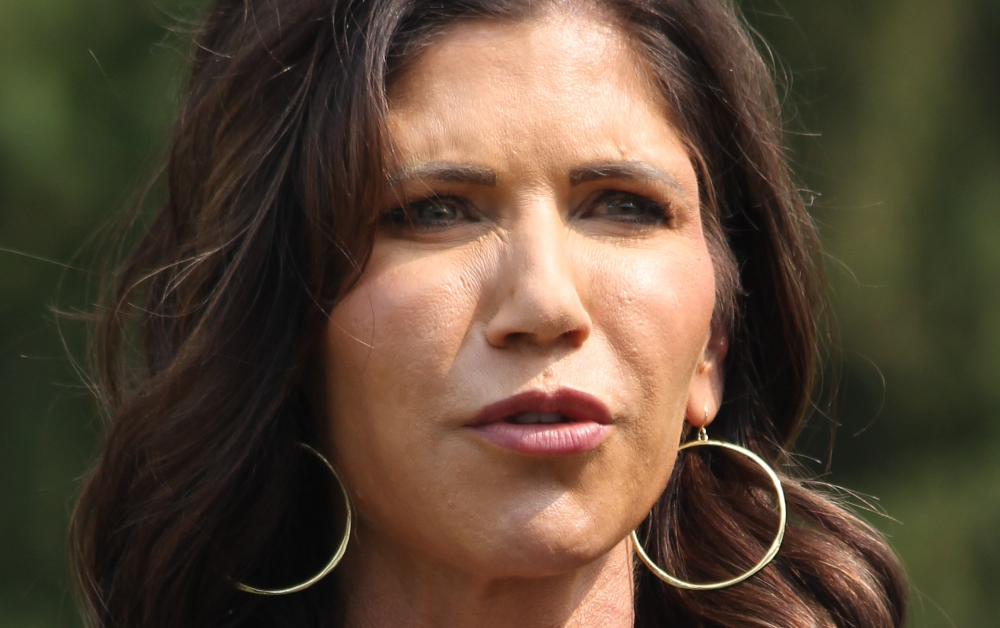Intoxicating hemp products are now banned in South Dakota after Gov. Kristi Noem signed a law intended to remove from the market all products containing delta-8 THC and other synthetic compounds.
Under the law, production, sales and distribution of “chemically modified or converted industrial hemp” are illegal. The law specifically bans delta-8 THC, delta-9 THC made from hemp, delta-10 THC, THC-O-acetate, HHC, THCP, and “any other THC isomer, analog, or derivative” of industrial hemp.
The new law targets gummies, vape pens, pre-rolled joints and smokable flowers that contain the intoxicating compounds, which are commonly called “diet weed” or “marijuana light.” The products have proliferated in South Dakota and all across the U.S. due to loopholes in the 2018 U.S. Farm Bill.
All of the banned substances are synthetically produced, and most are made by putting CBD from hemp flowers through a chemical process. Health officials have warned that the compounds are not under any federal regulations and are essentially bathtub products. Some have shown wildly varying levels of intoxicants as well as contaminants, and incidences of sickness and hospital visits, and even one child’s death, have been reported.
Farm Bill loophole
While the 2018 Farm Bill legalized hemp and all of its downstream derivatives federally, it failed to account for synthetic, psychoactive outputs that can be made from hemp flowers.
The South Dakota measure unanimously passed the state House of Representatives in January and was nearly unanimous in the Senate last month.
Now banned, “chemically derived cannabinoid(s)” are defined as “a chemical substance created by a chemical reaction that changes the molecular structure of any chemical substance derived from the cannabis plant.”
The definition does not include cannabinoids extracted by natural methods, “non-psychoactive cannabinoids” or “cannabinoids in a topical cream product.”
The law defines “industrial hemp product,” as “a finished manufactured product, or consumer product made from industrial hemp with a total delta-9 tetrahydrocannabinol concentration of not more than three-tenths of one percent (0.3%), derived from or made by processing industrial hemp.”
Those who violate the law could get up to one year in jail, a $2,000 fine, or both.
Fears over extracts
Some stakeholders have said depending on interpretations of the new law, it could serve as a blow to those who sell CBD extracts over-the-counter as health supplements. Such products generally only contain trace amounts of natural THC cannabinoids, considered to be legal.
Sen. Ryan Maher unsuccessfully tried to amend the law to restore an exemption for products that contain only trace amounts of cannabinoids as it moved through the Senate. He said he feared the law could result in a flood of products on South Dakota streets this spring as retailers clear their illegal inventory of flower-based hemp goods.
No in-state production
Virtually all of the intoxicating hemp products on the market in South Dakota were made out-of-state. South Dakota hemp growers overwhelmingly farm grain and fiber crops, enough to make the state the second biggest hemp grower in 2022 (behind Montana – 3,000 acres), when harvested fields increased 35% to 2,540 acres, up from 1,674 in 2021.
Noem last week also signed a bill that removes the prohibition on the ability of law enforcement and other government agencies to “search, seize, prosecute, or impose disciplinary action” on the state’s medical cannabis businesses. The provisions included in the law protect dispensaries, cultivators, manufacturers, and testing laboratories.
Noem, a Republican, has a history of flip-flopping on hemp but has leaned toward tight restrictions. She vetoed a bill to legalize industrial hemp production in the state in 2019, suggesting it would be a first step to eventually legalizing recreational marijuana. She eventually dropped her opposition and signed a hemp bill in 2020.

- States say 2018 Farm Bill has ‘failed,’ urge Congress to rein in intoxicating hemp
- New York CBD market under serious threat as judge dismisses stakeholders’ lawsuit
- After delta-8 THC makes students sick, classmates spur ban on intoxicating hemp
- Delta-8 THC, other ‘diet weed’ products belong in pot dispensaries, says Arizona AG
- New York CBD market ‘halted,’ as crackdown brings ‘immediate and catastrophic effect,’ lawsuit says
- DeSantis’ signature on Florida bill could severely cripple nation’s 2nd biggest CBD market
- New Thai government likely to crack down on both marijuana and CBD
- South Dakota law aimed at hemp intoxicants is likely to wipe out CBD market
- South Carolina bans CBD and intoxicating hemp products as states continue crackdowns
- When it comes to ‘novel food’ and CBD in the UK, more questions than answers
- Connecticut AG cracks down on illegal sales of delta-8, delta-9 products
- Oklahoma hemp task force won’t deal with flowers, likely leaving CBD to marijuana regulators
- CBD down, fiber up, as early signs show U.S. hemp harvest stabilized in 2023

